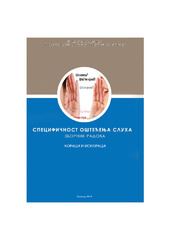Приказ основних података о документу
Izazovi socijalne participacije gluve i nagluve dece u inkluzivnim školama
The challenges of social participation of deaf and hard of Hearing children at inclusive schools
| dc.contributor | Isaković Ljubica | |
| dc.contributor | Kovačević Tamara | |
| dc.creator | Radić-Šestić, Marina | |
| dc.creator | Šešum, Mia | |
| dc.date.accessioned | 2021-06-17T13:44:10Z | |
| dc.date.available | 2021-06-17T13:44:10Z | |
| dc.date.issued | 2018 | |
| dc.identifier.isbn | 978-86-6203-116-7 | |
| dc.identifier.isbn | 978-86-6203-116-7 | |
| dc.identifier.uri | http://rfasper.fasper.bg.ac.rs/handle/123456789/2869 | |
| dc.description.abstract | .Kvalitet i učestalost socijalne participacije gluvih i nagluvih učenika u vršnjačkim grupama koje čine pripadnici tipične populacije zavisi od niza ličnih i sredinskih činilaca, kao i ograničenja koja su direktna ili indirektna posledica oštećenja sluha. Iako se uvođenjem inkluzivnog obrazovanja obezbeđuje svakodnevni kontakt učenika sa ome- tenošću i učenika tipičnog razvoja, jedan od osnovnih ciljeva inklu- zije, koji se odnosi na postizanje društvene kohezije, neće biti ispunjen ukoliko izostane prihvatanje dece sa ometenošću od strane vršnjačke grupe. S obzirom na to da nalazi istraživanja uglavnom ukazuju na ne- dovoljnu prihvaćenost gluvih i nagluvih učenika od strane tipičnih vršnjaka, u ovom radu su analizirane kompleksne determinante razvoja socijalnih veština gluve i nagluve dece, kao i drugih činilaca na koje literatura ukazuje da ograničavaju socijalnu participaciju gluve i nagluve dece u inkluzivnim školama. | |
| dc.description.abstract | The quality and frequency of social participation of deaf and hard of hearing students in peer groups composed of the members of the typical population depend on a series of personal and environmental factors as well as on the limitations which are a direct or indirect consequence of hearing impairment. Although the introduction of inclusive education provides daily contacts between students with disabilities and children of typical development, one of the essential aims of the inclusion, which relates to the accomplishment of social cohesion, will not be fulfilled if the children with disabilities have not been accepted by the peer group. Considering the fact that the results of the research mainly point to insufficient acceptance of deaf and hard of hearing students by the typical peers,the complex determinants of the development of deaf and hard of hearing children’s social skills as well as other factors which the literatures points to as limiting the social participation of deaf and hard of hearing children at inclusive schools were analysed in this study. | |
| dc.language | sr | |
| dc.publisher | Univerzitet u Beogradu – Fakultet za specijalnu edukaciju i rehabilitaciju/ University of Belgrade – Faculty of Special Education and Rehabilitation | |
| dc.relation | info:eu-repo/grantAgreement/MESTD/Basic Research (BR or ON)/179025/RS// | |
| dc.rights | openAccess | |
| dc.rights.uri | https://creativecommons.org/licenses/by-sa/4.0/ | |
| dc.source | Tematski zbornik radova - „Specifičnost oštećenja sluha – koraci i iskoraci,” Beograd, 2018. | |
| dc.subject | inkluzivno obrazovanje | |
| dc.subject | gluva i nagluva deca | |
| dc.subject | socijalna participacija | |
| dc.subject | inclusive education | |
| dc.subject | deaf and hard of hearing children | |
| dc.subject | social participation | |
| dc.title | Izazovi socijalne participacije gluve i nagluve dece u inkluzivnim školama | sr |
| dc.title | The challenges of social participation of deaf and hard of Hearing children at inclusive schools | |
| dc.type | conferenceObject | |
| dc.rights.license | BY-SA | |
| dc.citation.epage | 179 | |
| dc.citation.other | : 165-179 | |
| dc.citation.rank | M44 | |
| dc.citation.spage | 165 | |
| dc.identifier.fulltext | http://rfasper.fasper.bg.ac.rs/bitstream/id/7979/14232rt.pdf | |
| dc.identifier.rcub | https://hdl.handle.net/21.15107/rcub_rfasper_2869 | |
| dc.type.version | publishedVersion |


